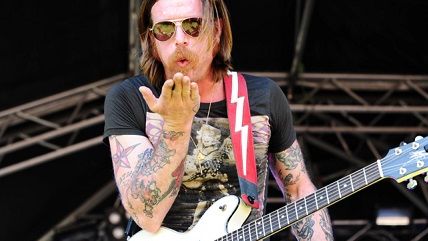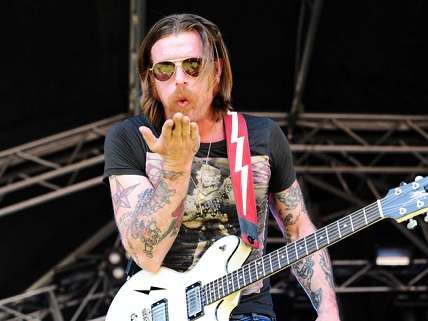What the Eagles of Death Metal Can Teach Us About Fighting Terrorism
The police can't be everywhere.


On Tuesday, the Eagles of Death Metal finally returned to Paris, playing a sold out concert at the Olympia that included many of the survivors of their last performance there, in November 2015.
What a ballsy move. Last November, of course, the EODM and their fans all became—suddenly, and horrifically—human targets of a brutal terrorist assault inside the Bataclan Theatre. Three jihadists armed with Kalashnikov automatic rifles stormed the doors of the theater and proceeded to systematically execute people in the crowd.
That night still sits like an unshruggable weight on Jesse Hughes, the Eagles of Death Metal's irrepressible lead singer. He keeps replaying the episode, over and over, in his head. "There's a certain thing that's unmistakable about impending doom, when death is on you," Hughes recalls in a recent interview with the music site Kerrang!.
"It took us a minute to get off the stage. I saw about seven people get shot before I got off. I knew two of the girls. I felt angry. I was yelling at one of them because they weren't moving. They were frozen in fear. All she had to do was back up three feet and roll over. And she didn't move. That bothers me, because they didn't know what to do. I have to wonder what was it that lacked in their lives that didn't prepare them."
The vile slaughter of 89 innocents at that concert hall in Paris left its mark on me too. I wasn't there, and I don't want to trivialize the experience of those who were, but I still personalized it. I attend a lot of concerts as a beautiful way to escape the seriousness of daily life. I could have been in that theater, I imagined. How would I have handled myself? Could I have protected my friends, my wife? For me, Bataclan was a tipping point, the moment I decided to get a gun. With the subsequent terrorist attack in San Bernardino, arming myself and my family felt more like an obligation, not just a right.
I didn't know this at the time, but the EODM frontman was way ahead of me. "I've been around guns all my life," he says. In an emotional interview with iTele, Hughes breaks it down:
"I'll ask you: did your French gun control stop a single fucking person from dying at the Bataclan? And if anyone can answer 'yes', I'd like to hear it. Because I don't think so. I think the only thing that stopped it was some of the bravest men that I've ever seen in my life charging head-first into the face of death with firearms. I think the only way my mind has been changed is maybe that until nobody has guns, everybody has to have them."
The Eagles Of Death Metal are particularly unlikely evangelists for your Second Amendment right to defend yourself. This is not a "message band." Their music has no higher purpose. They are not like Bruce Springsteen singing songs about the struggles of the working class, or Bono preaching about the life and death of MLK. The Eagles of Death Metal have, most certainly, never penned a 20 minute Randian song cycle about the inherent dangers of benevolent totalitarianism. No, the Eagles of Death Metal are a joke. Literally. The band is an ontologically impossible attempt to superimpose the soft country rock of The Eagles with, well, death metal. It simply can't be done, but they do it anyway. The results are utterly ridiculous, just like some of the best rock n' roll.
I'm no religious scholar, but I am certain that the latest EODM album, Zipper Down, could not exist under Sharia Law.
And yet, Jesse Hughes, the tattooed rocker from southern California, is still schooling the world on what could be the best way to defeat radical Islam, and the very decentralized, very global, threat of terrorism. Why not try more liberty, not less? Sacrificing essential liberties for a false sense of security has simply not worked. Case in point: France itself. As Matt Welch has already documented, the French response to fighting terrorism has been an all out assault on the civil liberties of the French people. There, the government regulates free speech, the practice of religion, and systematically invades the privacy of innocents. And of course, it is all but impossible for a responsible Parisian to own and carry a gun. And yet none of this stopped the slaughter on November 13, 2015, or at the headquarters of Charlie Hebdo on January 7, 2015.
We Americans have a different model, of course. Our Constitution is our original source code; non-negotiable protections intended to defend our individual liberties from the power of the state. But if you listen to the public debate this presidential primary season—sans Rand Paul—you will hear both Democrats and Republicans publicly rethinking the fundamental liberties protected by the Bill of Rights. Hillary Clinton wants to limit online speech. Donald Trump wants to ban Muslims. Barack Obama and Bernie Sanders want to grab your guns, but Jeb Bush and Marco Rubio want to grab your phone's metadata and your due process under law. Given how Washington operates, a grand compromise will likely just grab them all, omnibus style.
I don't support any of these measures out of moral principle. More to the point, perhaps, is the reality that such measures simply can't "make us safe." Such is the nature of the radically decentralized world we live in. The challenge of defeating decentralized terrorist networks with centralized, top-down systems (think Department of Homeland Security) was first suggested by Ori Brafman and Rod Beckstrom in their 2007 book The Starfish and the Spider: The Unstoppable Power of Leaderless Organizations. Starfish organizations decentralize information and decision-making, and are leaderless in the sense that there is no command center or bureaucracy that dictates things from the top down. United by a radical ideology that holds them together, terrorist networks are virtually impossible to "wipe out." Cut off an arm of a starfish, as the Brafman/Beckstrom analogy goes, and you don't kill the organization, you just make it stronger by creating more starfish organizations.
So how could traditional law enforcement protect us from such a threat? Ignoring the inherent problems with giving police so much unlimited power, it seems implausible that there would ever be enough manpower, always positioned in the right place at the right time, to defend helpless and unarmed innocents from attack. As Judge Andrew Napolitano puts it: "The police simply cannot be everywhere." That's why Jesse Hughes wants you to be armed, self-aware, and prepared. "I don't want to see anything like this ever happen again," he says. "And I want everyone to have the best chance to live and I saw people die that maybe could have lived, I don't know, but I wish I knew for sure if they could have had a better chance."
Tuesday night was no doubt cathartic for all of the survivors of the terrorist assault at the Bataclan last November. "Rock and roll for me has always been fun, and I am not going to let anyone take that away from me or my friends," Hughes pronounced when the Eagles of Death Metal took the stage. Life, liberty, and the pursuit of rock n' roll. Now that's something worth defending.
@mkibbe is the author of Don't Hurt People and Don't Take Their Stuff (HarperCollins 2014).
[Correction: This piece originally stated that the Eagles played at the Bataclan for their return-to-Paris show. They played the Olympia.]


Show Comments (79)